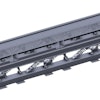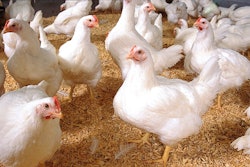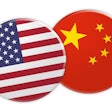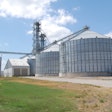Transcription of Feed & Grain Chat withVince Peterson, president & CEO of US Wheat Associates
Elise Schafer, editor of Feed & Grain:Hi everyone, welcome to Feed & Grain Chat. I'm your host Elise Schafer, editor ofFeed & Grain. This edition of Feed & Grain Chat is brought to you byWATT Global Mediaand Feedandgrain.com.Feedandgrain.comis your source for the latestnews,product and equipmentinformation for the grain handling and feed manufacturing industries.
Today I'm joined on Zoom by Vince Peterson, president and CEO of US Wheat Associates, the export market development organization for the U.S. wheat industry. He’s here today to discuss the impact on wheat exports of theCanadian PacificKansas City Railroad. Hi, Vince, how are you?
Vince Peterson, president & CEO of US Wheat Associates:I'm great, Elise, so nice to be on here this morning! Thanks for the invitation.
Schafer:Well, thank you for coming on, we appreciate it! Now, let's get right into it. Vince, tell us about the members that make up the US Wheat Associates and how critical isU.S. transportationto your members.
Peterson:All right, our membership starts at the grower level, wheat producers, who are organized through 18 wheat commissions, state organized wheat commissions, such as theKansas Wheat Commission,North Dakota Wheat Commission, and 16 others, so our members are these wheat commissions.
Our board of directors, our wheat producers that are put on our board by these commissions, in the end, the purpose of the organization is to promote exports of U.S. wheat. So, transportation, of course is a vitally important link from the farm to the export customer. So it's a critical issue, whether that's truck, rail, barge, waterborne, ocean shipping, all of those things play into a very big role for us.
Schafer:So, what was your feedback to the Surface Transportation Board about the CP KCS merger when it was being reviewed?
Peterson:When we looked at this to begin with, and maybe just a slight context, not to go too far back with it, but you think back this was done when not only the CP but theCN Canadian Nationalrailroad were interested in merger —both Canadian railroads were initially interested. This also came all at a time when we had COVID as a background with pandemic going on and supply chain disruption. All those things were sort of the background for all of this going on, so there were a few concerns that we had through that. One was that we had already seen up to about a 2,000 decrease in competition for Class I railroads.
I think we were down to seven railroads at the time and this will reduce that further to six. And we had witnessed some lack of competitive issues in the railroad business over that period of time. Even theNational Grain and Feed Associationthis last yearput together public comments criticizing the railroadsfor lack of servicing, so I think we’re in somewhat company with the grain shippers on those sorts of things.
But one of the things that we had seen over the course of time was very specific to wheat. That was the cost of moving wheat out of the Midwest, to the Gulf to Mexico was being disadvantaged to other commodities — corn, soybeans, in particular. In other words, wheat rates for the same cars, same power, same origin, same destination were being charged about 30 cents a bushel more than corn and soybeans for the same routes.
So, enter the discussion with the Canadian railroads, and now we’re in the place where we are probably going to put in more Canadian wheat into the system because these railroads are big originators in Canada and the systems are so different in Canada versus United States in terms of regulatory issues — rail rate caps and those kinds of things — that we’re somewhat concerned that that's going to put some of our shippers in greater competition, the U.S. domestic market and the Mexican market. Now not only to compete with corn and soybeans for rates domestically, we also may see more Canadian wheat into the mix, so there were several things that were on our radar screen of concerns through this time.
Schafer:How does the US Wheat Associates feel about the seven-year oversight that the STB included in this merger approval?
Peterson:I think that's good, the fact that they do have an ongoing review process for that to go on. We really had hoped that they were going to consider a few more things even beyond just a review process. Among those were the ability for railroads — and these are things that are under the authority of STB to address — things like through rate regulation, terminal trackage rights, reciprocal switching, some of those things that we had hoped that they might address in this merger to allow us, or assure us, that there’s going to be more possibilities for growers that may be a little bit displaced by this to be able to share they had access to all of these kind of markets.
另外我们有要求,我们会appreciate it if they did in the review process, was to get access to weighed billed data on wheat coming out of Canada, or in other words, something that shows you precisely what has been paid for rates from those areas versus as a comparable areas out of North Dakota, Minnesota to various areas, and we want to be sure that we're not being disadvantaged from one origin to another in terms of wheat rates. So, the review period is great. I think we're glad they're going to do that, but we were going to continue to push them for some specifics on that.
Schafer:Now what about some victories. How will the new rules under theFinal Offer Rate Reviewhelp U.S. ag shippers?
Peterson:Hopefully that's going to simplify rate arguments somewhat. It’s a process they've been worked on for some period of time, and this in particular is an issue that we’ve had some concerns about over the wheat rates and the differentials to the other commodities. We’re hoping that streamlines things and puts us more in an arbitration sort of situation rather than just a —the railroads are going to object this — a monopolistic pricing model, and so we're hoping that’s going to help us a little bit on the competitive side of this.
Schafer:Vince, thank you so much for your insights today.
Peterson: Elise, very glad to be here — big subject. Could probably spent a lot of time talking about this. Thanks for the opportunity.
Schafer:You’re so welcome. That's all for today's Feed & Grain Chat. If you'd like to see more videos like this, subscribe to ourYouTubechannel,sign up for the Industry Watch daily eNewsletter, or go to feedandgrain.com andsearch for videos. Thank you again for joining, and we hope to see you next time!
Earlier this month, theSurface Transportation Board(STB) issued itsapprovalofCanadian Pacific Railway Limited (CP)'s acquisition ofKansas City Southern Railway Company (KCS), with conditions including an unprecedented seven-year oversight period and others designed to mitigate environmental impacts. Thenewly formedCanadian Pacific Kansas City (CPKC) will create the first railroad to offer single-line service spanning Canada, the U.S. and Mexico.
Agricultural commodities groups, such asUS Wheat Associates(USW), voiced concern to the STB over further rail consolidation during the review period in 2022. In thisFeed & Grain Chat, USW President & CEO Vince Peterson shares his view that impeding competition in the rail market increases rail rates, particularly for wheat shippers, making U.S. wheat less competitive in the global marketplace.






















